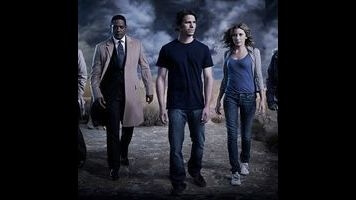The Event: "Loyalty"

There is such a thing as a forgivable logical inconsistency or plot hole in a television show. Even when there is no explanation or alternate theory that smooths out the narrative indiscretion, I can write a pass when I feel like the story has gotten somewhere interesting as a result. There have been many such holes or sloppy choices in The Event, and the reason the show hasn’t lived up to the promise of its pilot is because so often the show wants you to accept storytelling flaws that don’t even yield anything good. The early episodes were like a chain story written by a group of people more interested than screwing and outdoing each other than collaborating harmoniously, and who zealously skim the prior chapters rather than actually reading them. I still get the feeling watching tonight’s episode that The Event has no actual writers’ room, that the writer of the next episode gets the script for the previous episode dropped on the doorstep and has to do the best he or she can. But for the first time, “Loyalty,” the best episode yet, left me feeling like there’s an interest in telling a terrific story rather than simply piling on twist after twist because they can.
Because I enjoyed the episode so much, I was able to grant immunity to the initial logical slip-up: the idea that Sophia would be allowed to go wherever she pleased with absolutely no visual monitoring whatsoever. Given the technological capabilities the EBEs (as I’m now partial to calling them) have demonstrated, it would stand to reason that dosing Sophia with the radioactive isotope might be a great idea in need of an equally great contingency plan. When Simon swipes some of the isotope and spikes the coffee-shop creamer with it, suddenly there are red dots all over the place and Sophia is rendered invisible. Then, and only then, does anyone think to send in agents to locate her or monitor security cameras to keep track of her whereabouts. I’m half-tempted to watch some scenes of Operation Blackbriar from The Bourne Ultimatum as a just-for-laughs comparison with The Event’s Bad News Bears intelligence gatherers.
It ultimately worked for me, though, as part of Simon Lee’s arc for the episode. After weeks of sort of trying to mimic Lost, “Loyalty” represented the first full-blown imitation of Lost’s episodic formula (right down to the whooshes), and to admirable effect. It obviously wasn’t original, but it delivered in just the same way. It deepened my understanding of a character I didn’t know or care that much about while delivering some emotionally powerful moments. Once Simon has figured out an escape plan for Sophia, he thinks he’s wriggled out of another noose, until Sterling’s aide concludes it has to be an inside job and goes to test Simon’s field team for traces of the isotope. Because I don’t completely trust The Event, even when I’m enjoying it, I was nervous that Sterling’s aide might honor Simon’s request to test his own men. But not so fast…Simon needs to be tested too. So Simon naturally panics, wallops Ol’ Boy with the suitcase and tosses him in a trunk.
Throughout the episode, we see the emotional toll that six decades of this kind of improvisation has had on Simon. A decade after the crash, he’s settled in Venice Beach, madly in love with a beach bunny named Violet. He wants to stay with her, to marry her, to build a life with her, but Thomas tracks him down and commands him to move on. People will get suspicious, naturally, when they notice that he’s barely aged years down the line. He leaves her, as he’s probably had to do several times with several lives, all in the interest of doing whatever it takes to help Thomas protect the EBEs and get them home. After finishing up at the CIA academy, he runs into Violet, who remembers him even in her advanced age. Yes, yes, I know, he just so happens to run into the love of his very long life on the other side of the country. But I forgave it, because I so enjoyed the scene in which he had to pretend he didn’t recognize her, while trying to savor the moment of being reunited with her as long as he could. I don’t often mention the acting on this show (for good reason), but I thought Ian Anthony Dale sold this moment. He comes back to her when she’s in the hospital, nearing death, telling her how if it was up to him they would have married and had children. “It was up to you,” she replies, not having lost her ability to shame with the rest of her cognitive functions.
 Keep scrolling for more great stories.
Keep scrolling for more great stories.
